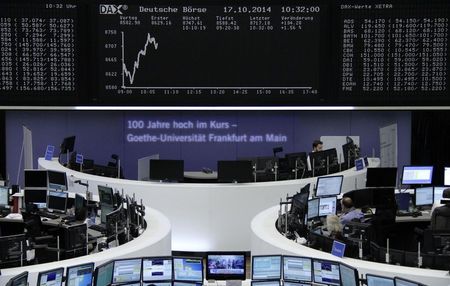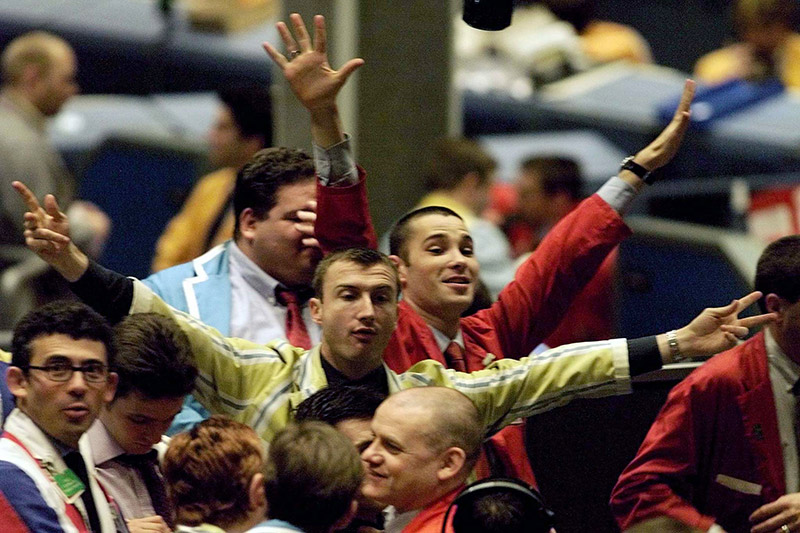By Marc Jones LONDON (Reuters) - World stocks hit a nine-month low on Friday but oil and southern European bonds were off their week's worst levels, as investors began to dust themselves off after one of the most volatile spells in world markets in years.
Nerves remained fragile, but some reassuring words from U.S. and European policymakers, U.S. data, and a sense there could be bargains to be had after the major falls in global equity and commodity markets, drew buyers in off the sidelines.
Bourses in London (FTSE), Frankfurt (GDAXI) and Paris (FCHI) started the day up 1 to 1.5 percent and Athens (ATG) rose 4.5 percent as Greek governments bonds steadied after their worst run since the height of the euro crisis in mid-2012.
In the currency market, the yen <JPY=> was also off its recent highs after another choppy session overnight, while oil was off four-year lows it has this week amid fears about the slowing global economy and of a new production glut. [O/R]
"It's been a very lively week, but it seems a bit calmer today," said Alvin Tan, a FX market strategist at Societe Generale in London.
"People are hoping to hear some soothing words from policymakers and it wouldn't be surprising to hear some dovish comments.. and that kind of rhetoric would certainly help settle markets."
The possible return to recession in the euro zone, a floundering economy in Japan, slowdown in China and the Ebola virus outbreak have conspired to rattle investors already fretting about the end of years of U.S. stimulus.
It has triggered volatility not seen in years and with bond yields already measly in the U.S. and other traditional safe ports like Germany and Japan, investors have been wondering where to turn.
It has been a fourth straight week of stock market falls in the U.S. (SPX) and Europe (FTEU3), while for growth-dependent emerging markets (MSCIEF) it has been six and leaves global stocks (MIWD00000PUS) at their lowest since January.
SOOTHING SOUNDS
Whereas Europe was brighter in early trading, Asia markets had stayed in the doldrums.
Tokyo's Nikkei (N225) led the losses, falling 1.3 percent on the day and 5.0 percent on the week, its biggest weekly fall in six months.
Mainland Chinese shares (SSEC) were also set to post their biggest fall in four months on worries over the economy and as investors brace for a landmark trading link between Hong Kong and Shanghai bourses.
Some U.S. data published on Thursday had helped settle the nerves across the Atlantic overnight as new unemployment benefit claims fell to a 14-year low last week <USJPB=ECI> and September industrial output <USIP=ECI> rebounded sharply.
Comments from James Bullard, the head of the St. Louis Federal Reserve Bank, also helped as he said the Fed may want to keep up its bond buying stimulus for now, given a drop in inflation expectations.
"We need to see a period of better data from the U.S., and especially Europe, for markets to really calm and volatility to cool," said Chris Weston, chief market strategist at IG Markets in Melbourne.
COMMODITY CALM
The dollar steadied along with most major currencies on Friday as stock markets bounced after a sharp sell-off that convulsed global markets this week. [FRX/]
Sterling <GBP=> was the standout among the major pairs, falling about a third of a percent after the Bank of England's chief economist said it could hold off raising interest rates for longer than previously thought.
Commodities markets were also calmer having been battered this week.
Brent crude was up close to a dollar to above $86 a barrel as it headed for a fourth weekly loss in a row, while safe-haven favourite gold <XAU=> slipped back to 1238.60 an ounce.
Investor were waiting on speeches from a handful of ECB policymakers for any fresh hints on its easing plans and from Federal Reserve chief Janet Yellen later in the day.
Top of her agenda will be the current market volatility. The so-called (VIX) fear gauge eased slightly on Friday but has spiked to 2-1/2 year highs this week as markets have struggled.

"I expect market volatility to gradually to come down," said Makoto Noji, senior strategist at SMBC Nikko Securities. "Loss-cutting trades will come to an end soon after a hectic week and markets will be looking to what kind of policy options major countries can adopt now."
(Reporting by Marc Jones; Editing by Toby Chopra)
